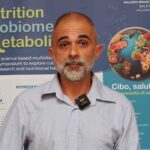During the Ri.MED Symposium 2024, held recently in Palermo (Italy) Microbiomepost conducted an exclusive interview with Heather Armstrong, from University of Manitoba and University of Alberta (Canada).
This interview explores the intricate role of dietary fibers in maintaining gut health, focusing on how the microbiome’s ability to process these fibers varies in healthy individuals versus those with autoimmune diseases like inflammatory bowel disease (IBD).
The research team discovered that while dietary fibers generally support gut health by fostering beneficial microbial activity, certain fibers can have adverse effects in individuals with microbiome imbalances. In IBD patients, for example, specific fibers such as beta-fructans may remain unfermented due to missing fiber-fermenting microbes, leading to inflammation and worsening symptoms.
This finding suggests that fiber intake should be personalized, especially for those with compromised microbiomes, to avoid potential harm. The team aims to develop predictive tools to assess the impact of different fibers on gut health, providing a foundation for tailored dietary recommendations that support both gut and overall health, particularly in sensitive populations.














